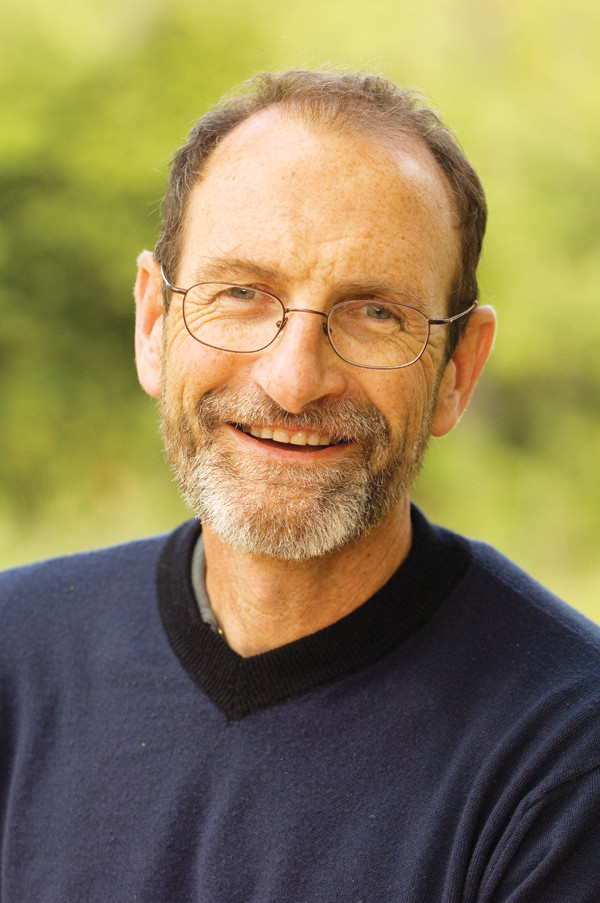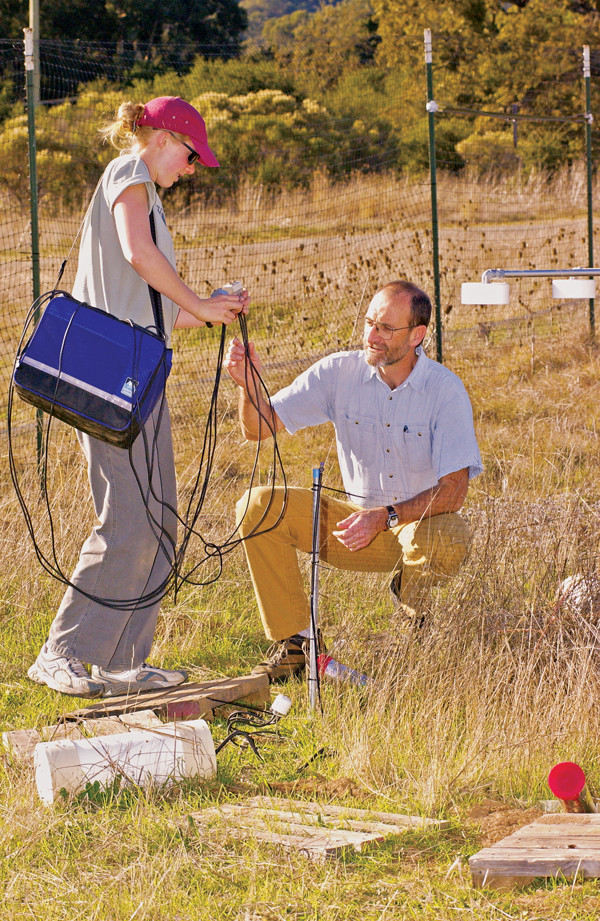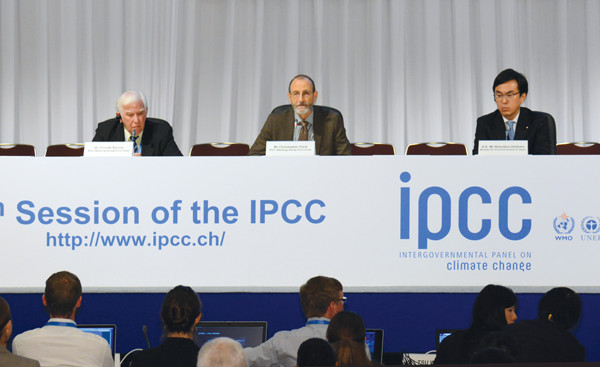
by Jay R. Thompson Monday, December 8, 2014

Chris Field, founding director of the Carnegie Institution's Department of Global Ecology, has won the Max Planck Research Award and the Roger Revelle Medal. Credit: Linda A. Cicero/Stanford News.
Last summer, the American Geophysical Union honored Chris Field, founding director of the Carnegie Institution’s Department of Global Ecology, with its annual Roger Revelle Award, which recognizes “outstanding contributions in atmospheric sciences, atmosphere-ocean coupling, atmosphere-land coupling, biogeochemical cycles, climate or related aspects of the Earth system.”
The Department of Global Ecology makes its home at Stanford University, where Field earned a doctorate in biology in 1981. Field is a professor of biology and environmental earth system science at the university and faculty director of Stanford’s Jasper Ridge Biological Preserve. He also serves as co-chairman of the United Nations Intergovernmental Panel on Climate Change’s (IPCC) Working Group 2, which assesses impacts, adaptation and vulnerabilities, and whose most recent report was approved for dissemination last spring.
A native of California, Field spent his formative years in several small towns in the western U.S. For years, he has commuted to the office via bicycle, rain or shine. Field spoke with EARTH contributor and former intern Jay R. Thompson about his love of wandering in nature, the challenges of communicating about climate change and blowing off steam through home renovation.
JRT: How do you feel about winning the Roger Revelle Award?
CF: I am incredibly proud to represent the area this award comes from. It recognizes a holistic perspective that climate isn’t just movement in the atmosphere.
JRT: What do you think has been your greatest contribution to global ecology?
CF: What I have really tried to do, especially over the last dozen years or so, is to understand the wide range of biological and other processes, how they interact and how to communicate those in a meaningful way.
JRT: What kind of research do you focus on these days?
CF: For nearly 20 years, my group has been doing climate-change experiments where we modify the climate — the temperature, the nitrogen. It’s a wonderful grounding experience, having a feeling for the way that organisms work. That’s been a source of endless fascination. Also, [we’re trying to understand] the environmental impacts of renewable energy — the requirements for water, climate feedbacks, and capitalization of space that are making the deployment of renewables difficult. For example, where do you run into the limits of renewables? Even with solar voltaics, they’re covering a lot of landscape.
JRT: What’s an average day like as director of the Carnegie Institution’s Department of Global Ecology?
CF: I have a great job. Most of my days are spent as a regular working scientist, evaluating students’ papers and doing experiments, although most of my time since finishing the IPCC assessment has been spent on science outreach. I love the process of science discovery and of science communication. I wouldn’t be upset if I could combine those two activities with a little bit less airplane time. I think that if you count up over the year, I spend between a fourth and a third of my time traveling.

Field analyzes plant growth with field technician Julia Silvis as part of a climate experiment at Stanford University's Jasper Ridge Biological Preserve located in the eastern foothills of California's Santa Cruz Mountains. Credit: Linda A. Cicero/Stanford News Service.
JRT: What do you enjoy most about the job?
CF: I really love interacting with people, and I love the sense of shared discovery, especially people working together to figure out things that one person couldn’t on their own. I also enjoy the essence of communication. I think of myself primarily as a teacher, and my goal is to help people understand challenging issues in the context of their lives — what makes sense to them and what they care about.
A lot of my research is just wandering around in nature and trying to figure out what is best. I love wandering in Stanford’s biological preserve and looking at the animals and watching the clouds and letting nature flow over me. Everywhere I travel, I try to find a place to walk around for a few minutes.
JRT: Tell me about your family.
CF: I have a spouse and two beautiful children who are 25 and 28. Neither is a scientist. My child-rearing philosophy was to encourage them to pursue the things that interest them the most. I’d love to see the world with more scientists, but we also need people in lots of other professions.
My wife is the staff scientist for Stanford’s biological preserve. She’s one of my closest colleagues. For the last several years, she and I have been restoring an old house to very high standards of energy efficiency. You get to take the frustrations of the week out with a table saw or a hammer. We spend a lot of time together and really enjoy that. I also spend a lot of time bicycling and hiking and projecting myself out into nature in a way that makes me pant and puff.
JRT: You’re often interviewed for climate change news stories. In what way do you think the media could more effectively handle the subject of climate change?
CF: I don’t give fault to the journalists; it’s a daunting task that they face. Public communication is set up to provide quick information on fast-breaking topics — a tornado or something like that. It’s difficult with climate change because the problem takes decades to unfold, and the solution takes decades to unfold.
The best reporters do a really good job of keeping that time frame in mind, but it’s tough. The incremental nature of the story is really difficult. I think the other thing that’s a big challenge is making it clear that climate change has many, many causative factors that aren’t all understood, and there could still be surprises. Each new paper transforms our understanding, but it’s rare that a single paper is revolutionary.

Field is co-chair of Working Group 2 — which assesses impacts, adaptation and vulnerability — for the Fifth Assessment Report of the Intergovernmental Panel on Climate Change. Credit: IPCC.
JRT: What questions do journalists never ask that you wish they would?
CF: I guess the thing that I almost never see covered in the science of climate change is whether people care enough to develop good solutions. The science, as often presented, is either something of a debate between the science community and the skeptics, or a collective process of science putting it out there and it getting tied up in political debates. I think what will matter in the future is whether people care enough about national security policy or global infrastructure to make it a priority. I think that’s the real question: Do people really care?
JRT: Where do you see the field of global ecology going and what do you feel could most improve your field?
CF: I think most people understand that we’re in a new era now. This truly is the Anthropocene. Humans dominate many aspects of the way earth systems work. We have big responsibilities and challenges that have never happened in our planet’s past. I think there’s still historical inertia that the world is so big and so long lasting that some people think we humans couldn’t have much influence.
[We could improve upon] how we provide information about climate change impacts. The problem is really complicated, but there are a lot of details that we don’t know with great precision and won’t know with great precision. [We could also improve upon] how to make the best decisions with limited information. I think we’re really transitioning the entire enterprise of studying climate change. No matter how much we do, we’re never going to have a precise forecast of what the future will be like.
JRT: Are you worried about the current generation of children in the context of climate change?
CF: Certainly. There are a number of impacts on the environment that will make the lives of today’s children more complicated and more difficult, like biological diversity and clean drinking water. At the same time, we have a world of people with a genuine desire for a better life. The goal is to find a way to do that and do it as harmlessly as possible. It’s a hard challenge, but it’s not an impossible one.
JRT: If you could say anything to the climate change deniers of the world, what would it be?
CF: I do get to say it. I think what people need to understand is that many aspects of the way the climate works and the way humans are changing it are thoroughly understood. The argument that uncertainty should be a cause for inaction doesn’t occur in most other aspects of life. Inaction is like deciding not to use safety systems like insurance, or air bags, or speed limits because we don’t know with certainty how the situations for which they’re designed will play out. You don’t need to know everything. It’s about building on the scientific information available. The smart action is to take precautions.
JRT: What are the chances that humanity will avoid the worst-case scenario of climate change?
CF: I wish I knew. I’m intrinsically an optimist. Throughout history, humans have come up with ways to solve major problems, including environmental problems. We have way better science and technology than we had in the past. The climate problem, I think, can be solved — not all the impacts, but the worst of them.
I think that if you look over the last year, there has been meaningful progress on dealing with the climate issue. Not solving it, but putting the pieces together to come up with solutions.
© 2008-2021. All rights reserved. Any copying, redistribution or retransmission of any of the contents of this service without the expressed written permission of the American Geosciences Institute is expressly prohibited. Click here for all copyright requests.